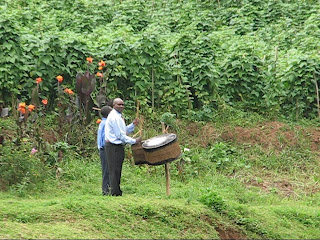When we first arrived in Kabale, I would often ask a student or fellow lecturer, "So, where is your home?" What I meant by the question was, "Where are you currently living?" Almost invariably the person would gesture toward the distance and reply, "I stay in Kabale, but my home is...," and then would come the name and description of a district and village somewhere many kilometres away. I quickly learned that the structures where people live here in Kabale -- whether it's a staff house, a hostel, a dorm, or a place in town -- is simply the place where they stay. "Home" is where they are from, where their family is, where their land is, regardless of how long it has been since they last visited that place.
Here's a similar insight: Back in May our team joined Global Teams missionaries from all over East Africa for a retreat in Kenya. The retreat was organized by GT's Missionary Caregivers, a group of women lovingly dedicated to pursuing our health and well-being. The first few days of the retreat we
 |
| Kabungo Parish near Bunyonyi. Rev. Hannington's son, Golden, is a student at BBUC |
So it's not a surprise that we've begun visiting people's homes. On a Saturday or a Sunday, we pile into our white van and say a prayer. Then we navigate our way down our hill to the main road, and
Typically, we all sit down for a cup of tea before anything else begins. Even if a church service
 where I'm to preach has begun (we can hear the drums beating calling the people to worship), we
where I'm to preach has begun (we can hear the drums beating calling the people to worship), wemust sit down for tea. First, a child of the host brings water warmed in a teapot and soap, and pours the water over our hands as we wash off the dirt of the road. Then we enter the house, and sit (or squeeze) around around a table where the tea awaits. Sometimes there is English tea (water and black tea), African tea (milk and chai), coffee (always a tin of instant Nescafe), sugar, milk, bananas, bread, honey, and g-nuts (peanuts). Sometimes there is just African tea and a few pieces of bread. Always there is graciousness and gratefulness, and time to pray and give and receive welcome.
Then the events of the day follow. If it's a Sunday, all of us are brought to the front of the congregation to sit in full view of the people. It is a long service of worshipping, singing, preaching
One other part I love is when I participate in giving communion to the people. I get to see and touch
After the service comes lunch. There must be lunch! Don't even try to excuse yourself from it! Squeeze in there and be ready to pile your plate high with matoke, "Irish" potatoes, sweet potatoes, goat, beef and/or chicken cooked in a wonderful broth, rice, greens, rolls, liver, intestines, and (once) rabbit. After you have eaten it all (mostly in silence), be ready for the fruit dessert -- the freshest pineapple, banana, passion fruit and watermelon ever to pass your lips. Then comes obushera -- this strong, mildly fermented drink that few white people can stomach, but that all Bakiga insist is wonderful and very good for digestion. Then comes...yes, more tea.
Finally, full of food and welcome, we totter back to the van, often carrying a bag of beans or potatos or vegetables as a parting gift. We clamber into the van, and begin the journey home.
These visits are both hard and wonderful. Hard -- we're still learning cultural cues, struggling with
Wonderful -- the hospitality is unceasing. Our hosts and their community consistently receive us with genuine excitement, unending hand-shakes, hugs, gifts, kind words, and food. We learn more of Bakiga culture in a few hours in the village than days in our house on our hill above town. We get to see a way of life that reveals both the beauty and challenge of the simpler, poorer life away from town. The geographical beauty is often stunning. We experience the humbling joy of being hosted by people who know how to love a lot with so very little. And we become friends with the people we're learning to love, knowing them in their home.











